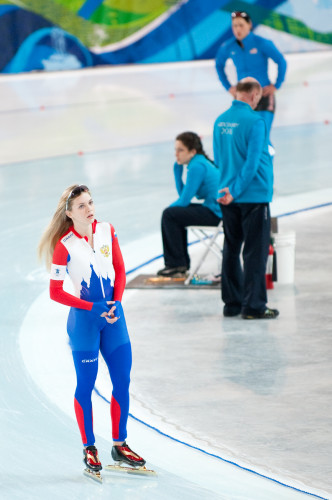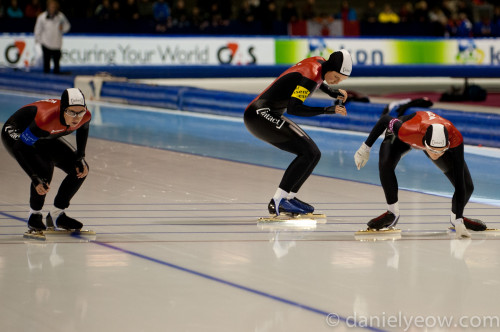Sochi Day 3: Mens 500m
it has always astounded me just how much hair a person can fit under those hoods…
Recap
Heartbreaking, agonising, saddening, Daniel Greig caught the tip of his blade in the starting straight and his hopes bit the dust as his knees hit the ice. Other than that, the men’s 500m result was, as expected, unexpected. At least I was correct about the times – five men went under 35 seconds in both races, and the winning time(s) of 34.6. In the first half of the event with Smeekens from the Netherlands hit 34.59 in his first run, giving all who followed a (very fast) rabbit to chase, which ultimately was caught by nobody. In the second run, it was Ronald Mulder’s turn to set the bar high for others to follow setting what turned out to be the fastest 500m time of the day. Twin brother Michel responded and went into the lead on aggregate, then in the very last pair Jan Smeekens put in a blistering run and seemed to take the gold medal by a whisker, but then lost by a split-hair when the times were electronically corrected, and in the space of a few gut-wrenching seconds which must have been an eternity for those involved, the result switched back, with Michel Mulder in the lead, followed by Smeekens, then Ronald. The first all-Dutch podium since Friday, and what is almost certainly the first all-Dutch podium in the 500m ever (the sprints are not traditionally a strength of the Dutch). As if to complete some kind of cosmic karmic loop, Michel skated up to the barrier where Daniel had been standing and cheering and gave him a big hug – tears of sadness to tears of joy.
Coming Up…
Next on the agenda is the ladies 500m. In much the same way that the men’s 5000m was, there is a heavy favourite, but all the positions behind her (no dirty joke intended) are wide open. The favourite of course, is Lee Sang Hwa of Korea, who won the gold medal in in 2010 in front of heavy favourite and world record holder at the time, Jenny Wolf of Germany. Since then she has been varying between very strong and dominant at the distance, and just last November, she broke her own world record in the 500m three times in four races (and winning all of those races by considerable margins). Four out of the five fastest times ever in the 500m are hers. Her current world record of 36.36 is a good half a second clear of the next fastest time ever skated that was not skated by her. The relatively close margins of the 500m may serve to hide just how dominant she is, but if she were to win by half a second over 500m, that is roughly equivalent to Sven Kramer’s recent dominating performance of winning the 5000m by five seconds. Watch her world record below, and be inspired (notice that she is paired with former world record holder Jenny Wolf who is not slow):
So who’s next? That is a much more difficult question. Only three other ladies have broken the 37-second mark, and they are Beixing Wang of China, Heather Richardson of the USA, and Jing Yu also of China. Yu Jing is unfortunately not starting at these olympics, so that leaves Wang and Richardson. Of course, looking at personal best times is not all there is to it, as those times are ordinarily set under optimal conditions on fast, high-altitude ice. Slow ice can change things considerably, especially for those who may not be used to it, and the American and Canadian skaters all live and train on fast ice. Looking at the results from last year’s world single distance championships (which were held in the same venue as this year’s olympics) bears this out as Richardson only finished 8th. Wang was second and she is my pick for the silver medal. In third we’re going to see a battle between former world record holder and silver medalist from Vancouver Jenny Wolf, Thijsje (pronounced TIE-shea) Oenema from Holland, and crowd favourite Olga Fatkulina. Expect challenges also from Nao Kodaira from Japan, and of course Heather Richardson. I’m going to pick Olga for the bronze because I feel that the crowd were a significant factor in Olga Graf’s brilliant bronze medal effort in the 3000m, and the home country advantage will have a similar effect on Fatkulina’s performance. If the 3000m result is anything to go by, also be on the looking for surprise performances from some of the other Russian skaters, such as Yekaterina Malysheva (pictured above), although I personally think that a surprise medal performance is less likely, since consistent performances across two races is required to win the event.
Pictured above, an example of each of the different starting positions – forward-facing, sideways-facing, and crouched down. I am of the opinion that the down start is a little bit faster than the various different kinds of upright starts for the simple reason that a skater’s centre of mass is lower and the skater is already in a low position. Staying low is key as it not only allows for a longer push, but reduces the frontal area of the skater which in turn reduces wind resistance. As we saw from the men’s race, consistency is also key, since Jan set the fastest time in the first race, while Ronald set the fastest time in the second race, and in the whole competition, but it was Michel who skated most consistently and came away with the gold medal. With any luck, the ladies’ competition, at least for all the places after the gold, will be just as hard-fought and exciting as the mens’ was today.
Don’t forget to click on the sochi2014 tag below to read my other articles about this olympics. The interested reader may also like to read about why skating at altitude makes a difference, or the subtle differences between inline skating and ice skating.



Leave a comment